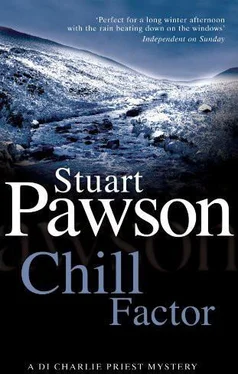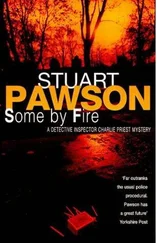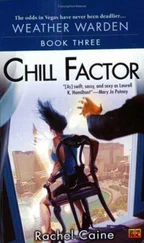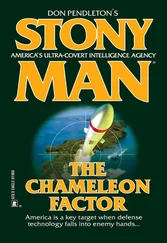Stuart Pawson - Chill Factor
Здесь есть возможность читать онлайн «Stuart Pawson - Chill Factor» весь текст электронной книги совершенно бесплатно (целиком полную версию без сокращений). В некоторых случаях можно слушать аудио, скачать через торрент в формате fb2 и присутствует краткое содержание. Жанр: Полицейский детектив, на английском языке. Описание произведения, (предисловие) а так же отзывы посетителей доступны на портале библиотеки ЛибКат.
- Название:Chill Factor
- Автор:
- Жанр:
- Год:неизвестен
- ISBN:нет данных
- Рейтинг книги:4 / 5. Голосов: 1
-
Избранное:Добавить в избранное
- Отзывы:
-
Ваша оценка:
- 80
- 1
- 2
- 3
- 4
- 5
Chill Factor: краткое содержание, описание и аннотация
Предлагаем к чтению аннотацию, описание, краткое содержание или предисловие (зависит от того, что написал сам автор книги «Chill Factor»). Если вы не нашли необходимую информацию о книге — напишите в комментариях, мы постараемся отыскать её.
Chill Factor — читать онлайн бесплатно полную книгу (весь текст) целиком
Ниже представлен текст книги, разбитый по страницам. Система сохранения места последней прочитанной страницы, позволяет с удобством читать онлайн бесплатно книгу «Chill Factor», без необходимости каждый раз заново искать на чём Вы остановились. Поставьте закладку, и сможете в любой момент перейти на страницу, на которой закончили чтение.
Интервал:
Закладка:
“Bet it wasn’t his fault,” I said.
“No,” Bob agreed. “He was dead unlucky. An old lady stepped off the pavement right in front of him and he skidded on loose gravel avoiding her. Lost control and sideswiped a telegraph pole.”
“Another write-off?” I asked.
“No, the electricity board straightened it up and dabbed some creosote on and it was as good as new.”
“That’s a relief. And what about the MG?”
“Oh, that was a write-off. Bent the chassis beyond repair.”
“It could happen to anyone. Have you taken it further?”
“Haven’t managed to raise anyone at Smith Brothers, but I’ll keep trying.”
“Do that, please, Bob,” I told him. “Who knows, somebody may have bought the wreck and rebuilt it. We’re getting warm, I can feel it.”
Nigel had a date with a sister from St James’s, so he wasn’t at the Spinners that evening. I assumed he meant the hospital, but with my luck she’d probably be from a convent of the same name. Dave brought Shirley to make up the number, and we sat looking miserable, hardly speaking. On the Saturday they were taking Sophie and her belongings to Cambridge in a hired Transit, hence their gloom. I had no excuse. I told them that Annette and I had decided not to have a future together, but didn’t mention her other boyfriend; the one with the two daughters. I said that she wanted to stay with the CID and being linked romantically with the boss might not be a good career move. They made sympathetic sounds and Shirley said: “Oh, Charlie, what are we going to do with you?”
I smiled, saying: “Looks like I’ll just have to wait for Sophie getting her degree,” and was rewarded with a growl from Dave as he picked up his glass. I’d touched his weak spot.
Bob rang me in the middle of Thursday morning, in a state of high excitement. “The Smiths’ve still got records, Charlie,” he told me, “after all these years. I talked to the son of the original proprietor. He found the file, eventually, and it said that the MGB was sold as scrap to someone called Granville Burgess-Jones, who owns a small motor museum just outside Newark. He’s a regular with them, builds and restores vehicles. Sometimes they’re not always roadworthy, or might not have an engine in, but they look good. Most of them are just for show. We might be in with a chance, Charlie. You know what these collectors are like — never throw anything away. If the bonnet wasn’t damaged,” he gushed, “he might still have it.”
“That’s fantastic,” I agreed. “Any chance of you getting over there?”
“It’s a bit awkward for me,” he began, “and you’re quite a lot nearer…”
“I understand, Bob,” I told him. “Give me all the names and numbers and leave it with me.”
“There’s a couple of other things.”
“Go on.”
“Well, after the Eileen Kelly assault we issued a statement saying that her attacker drove a dark sports car, possibly a Jaguar, so Silkstone would have known what we were looking for.”
“And destroyed the mascot.”
“Exactly.”
“Mmm. Did you say a couple of things?”
“Yeah. I’ve been thinking. Even if we find the actual bonnet, it won’t have a serial number on it, or anything. The only link between it and Silkstone is the paperwork. It’s vital we maintain the integrity of that.”
“God, you’re right,” I told him. “Good thinking. OK, here’s what we do. I’ll set off for Newark in about, oh, an hour. Any chance of you ringing the local police and having someone meet me at the Smith Brothers’ yard, just to witness things? It’ll take me about two, two and a half hours to get there.”
“No problem. Good luck, and let me know what you find.”
“Thanks, Bob, you’ll be the first to know. Meanwhile, I’ve another job for you. Put it all down in writing, particularly this conversation. Make it read as if we have a hypothesis, and all we have to do to prove it is examine the bonnet of that MG. That’s what our entire case revolves around.”
Five minutes with the map can save you fifty on the road. I just made that up. It needs working on, but it’s true. Head for the M1, A57 at J31 and then the A1 down into Newark. Smith Brothers were on a trading estate on the south side, as you left town, I was told. I memorised the route and set off.
I reached my destination half an hour earlier than expected thanks to clear roads and a reckless disregard of speed limits, but I was still overtaken by a procession of expensive cars on the motorway, heading for the next appointment. They can’t all have believed that they’d be able to sweet-talk the traffic cops because they were on their way to nail a murderer, but they drove as if they did.
I lost the half-hour looking for the yard. It was well outside town, at an old World War II bomber station, and the business was based on the storage capacity of three huge hangars. There were wrecked cars everywhere: piled in heaps outside; stacked neatly on pallets inside. Multicoloured conglomerates of twisted metal, chrome and glass; each one, I thought, bringing misery to someone. About ten people a day are killed on our roads, dotted about the country like a mild case of chicken pox, but this was where the evidence came together in one great sore. Some were hardly damaged, awaiting the assessor’s go-ahead to repair; others — many of them — were unrecognisable, and you knew that people had died in there. Once these hangars had housed the bringers of carnage, now they housed the results. A corner was reserved for bent police cars, gaudy in their paintwork but strangely silent, like crippled clowns. Wandering down the first aisle, between the neatly shelved wrecks, I saw abstract images, paintings and photographs, everywhere I looked. I tore myself away and knocked at the office door.
A uniformed PC was inside, drinking tea with a man in a blue shirt and rainbow tie. A woman in a short skirt with a ladder in her tights, a small-town siren, was typing in the corner. “DI Priest,” I announced to all present, “Heckley CID. Hope I haven’t kept you waiting.”
The PC stared at me, open mouthed, and the man in the shirt coughed into his hand. “Lost your tongue?” I asked the PC.
“No, er, Sir,” he mumbled, reaching for his hat.
“Never mind that,” I said, turning to the other person and asking: “Mr Smith, is it?”
“Um, yes,” he replied uncomfortably.
“Good. I understand you have some records for an MGB that was brought into here back in 1982.” I told them the registration number and continued: “A colleague in Somerset has rung you, hasn’t he?”
The PC unwound himself from the chair and stood up. He was only about twenty-two, but even taller than me. “Could I, er, see your ID, Sir, if you don’t mind, please?”
“Sure.” I already had it in my hand. He took it from me, studied it carefully, then said: “Oh, heck.”
I pushed some papers to one side on a desk against the opposite wall and perched my backside on a corner of it, saying: “I think you’d better tell me all about it.” I folded my arms in the pose of a patient listener and waited, except my patience was rapidly evaporating.
“I’ve just arrived, Sir,” the PC stated, and introduced himself. “I came straight here when I received the message, but thought I must have missed you. Mr Smith had better explain.”
I turned to Mr Smith. When Bob had described him as the son of the proprietor I’d immediately formed an image of a young man barely out of college, but he was probably in his late forties. Another reminder of the passing years.
“Well,” he began. “I, er, received this telephone call, yesterday, I believe it was, from the police about the MG. Nothing new in that, it’s always happening, except usually it’s about something that came in recently, not twenty years ago. I said that we kept all the record cards and that we would probably have it somewhere if he gave me the dates.” He turned to the woman, who had stopped typing and was listening to our conversation. “Glynis here found it, didn’t you, duck?”
Читать дальшеИнтервал:
Закладка:
Похожие книги на «Chill Factor»
Представляем Вашему вниманию похожие книги на «Chill Factor» списком для выбора. Мы отобрали схожую по названию и смыслу литературу в надежде предоставить читателям больше вариантов отыскать новые, интересные, ещё непрочитанные произведения.
Обсуждение, отзывы о книге «Chill Factor» и просто собственные мнения читателей. Оставьте ваши комментарии, напишите, что Вы думаете о произведении, его смысле или главных героях. Укажите что конкретно понравилось, а что нет, и почему Вы так считаете.












